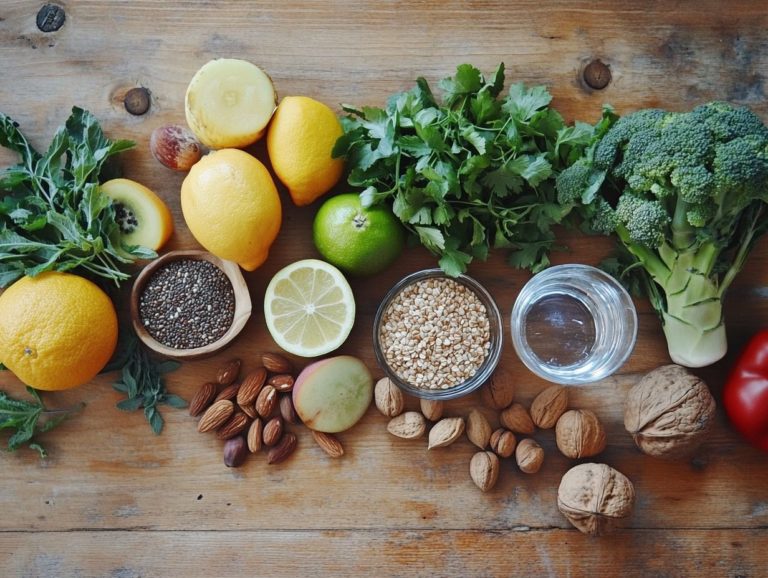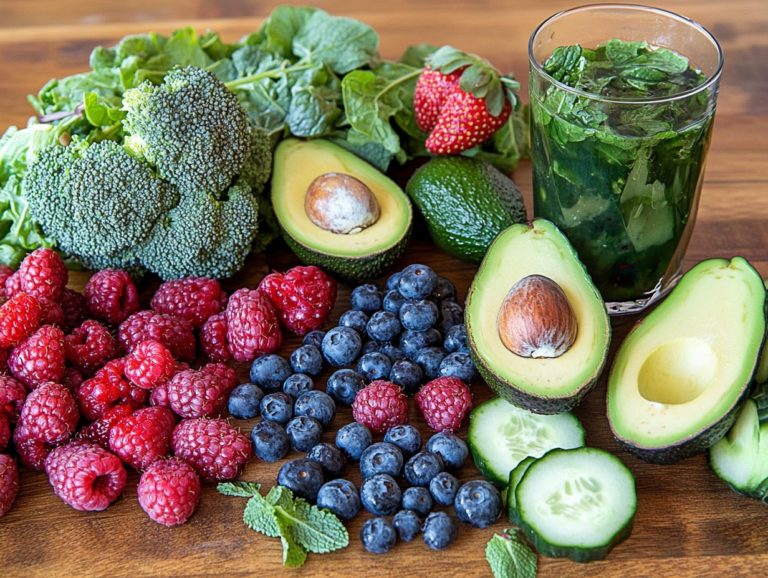Understanding the Benefits of Whole Grains
Whole grains are often celebrated as a nutritional powerhouse. But what exactly are they, and why should you consider incorporating them into your diet?
This article will navigate you through the essential aspects of whole grains, covering their definition, types, and impressive health benefits.
You’ll learn how they stack up against refined grains, receive practical tips for seamlessly weaving them into your meals, and explore any potential risks involved.
Discover how whole grains can transform your meals!
Contents
- Key Takeaways:
- What are Whole Grains?
- Why Whole Grains Boost Your Health
- Whole Grains vs. Refined Grains
- Incorporating Whole Grains into Your Diet
- Potential Risks of Whole Grain Consumption
- Frequently Asked Questions
- What are whole grains and why are they beneficial?
- What are the different types of whole grains?
- How much whole grains should I consume daily?
- What are the health benefits of whole grains?
- Are whole grains suitable for individuals with gluten intolerance or celiac disease?
- How can I incorporate more whole grains into my diet?
Key Takeaways:
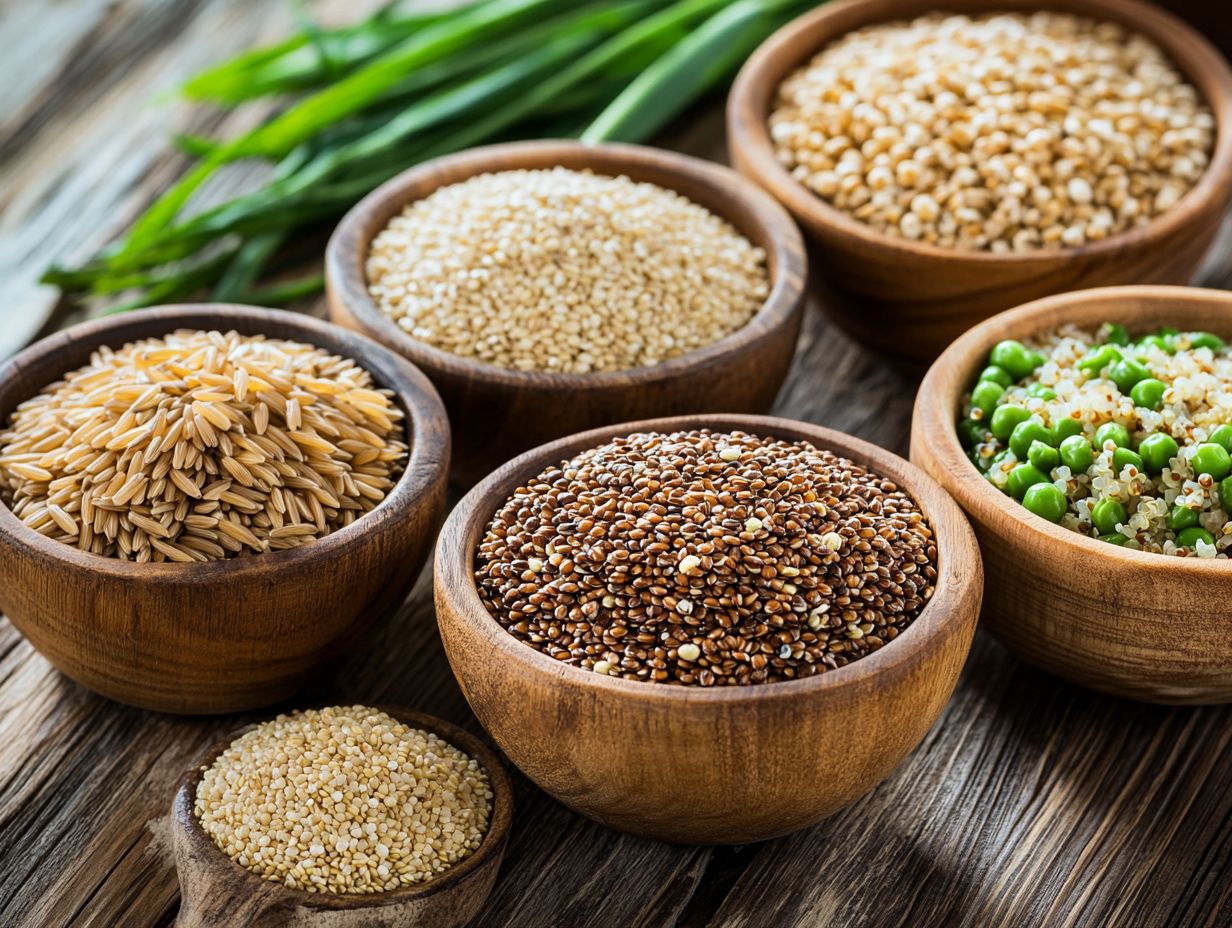
Whole grains are a group of foods rich in nutrients, including a variety of grains such as wheat, oats, and quinoa. They provide essential vitamins, minerals, and fiber for overall health and well-being.
Incorporating whole grains into your diet can lower the risk of chronic diseases such as heart disease, diabetes, and certain types of cancer. They are also beneficial for weight management and digestive health.
Compared to refined grains, whole grains contain more fiber, vitamins, and minerals. They also have a lower glycemic index a measure of how quickly foods raise blood sugar which can help regulate blood sugar levels.
Aim to replace processed grains with whole grains for maximum health benefits.
What are Whole Grains?
Whole grains are unrefined treasures that keep all parts of the seed intact the bran, germ, and endosperm. This makes them an exceptionally rich choice for your diet.
Understanding the various types of whole grains, like oats, brown rice, and quinoa, is important as they play a crucial role in creating a balanced diet aligned with dietary guidelines from health organizations.
By adding whole grains to your meals, you’re not just boosting your nutrient intake; you’re also tapping into the many health benefits that these fiber-rich foods offer.
Definition and Types of Whole Grains
Whole grains encompass a diverse range of unrefined grains, preserving all parts of the grain kernel, with options including oats, brown rice, quinoa, and more.
In contrast to refined grains, which have had the bran and germ stripped away to leave only the starchy endosperm, whole grains are a treasure trove of nutrients vital for your overall health. Refined grains, like white rice or white bread, often lack fiber, vitamins, and minerals, resulting in lower nutrient density.
Take quinoa, for example it’s notable for its complete protein profile and high fiber content, which aids digestion. Brown rice provides complex carbohydrates along with essential B vitamins, while oats stand out as a fantastic source of soluble fiber, known to help lower cholesterol levels.
Incorporating a variety of whole grains into your diet can enhance your energy levels and improve heart health, truly elevating your overall well-being.
Why Whole Grains Boost Your Health
The nutritional benefits of whole grains are extensive. They are packed with essential nutrients like fiber, antioxidants, magnesium, zinc, and iron, all playing a crucial role in your overall health.
Incorporating whole grains into your diet can lower cholesterol levels, manage blood sugar, and reduce the risk of chronic diseases like heart disease and type 2 diabetes. This makes them an integral part of any healthy eating plan.
The high fiber content supports digestive health and provides a satisfying feeling of fullness, aiding in weight management and promoting longevity.
Start today swap out your white bread for whole grain options and feel the difference!
Key Nutrients and Health Benefits
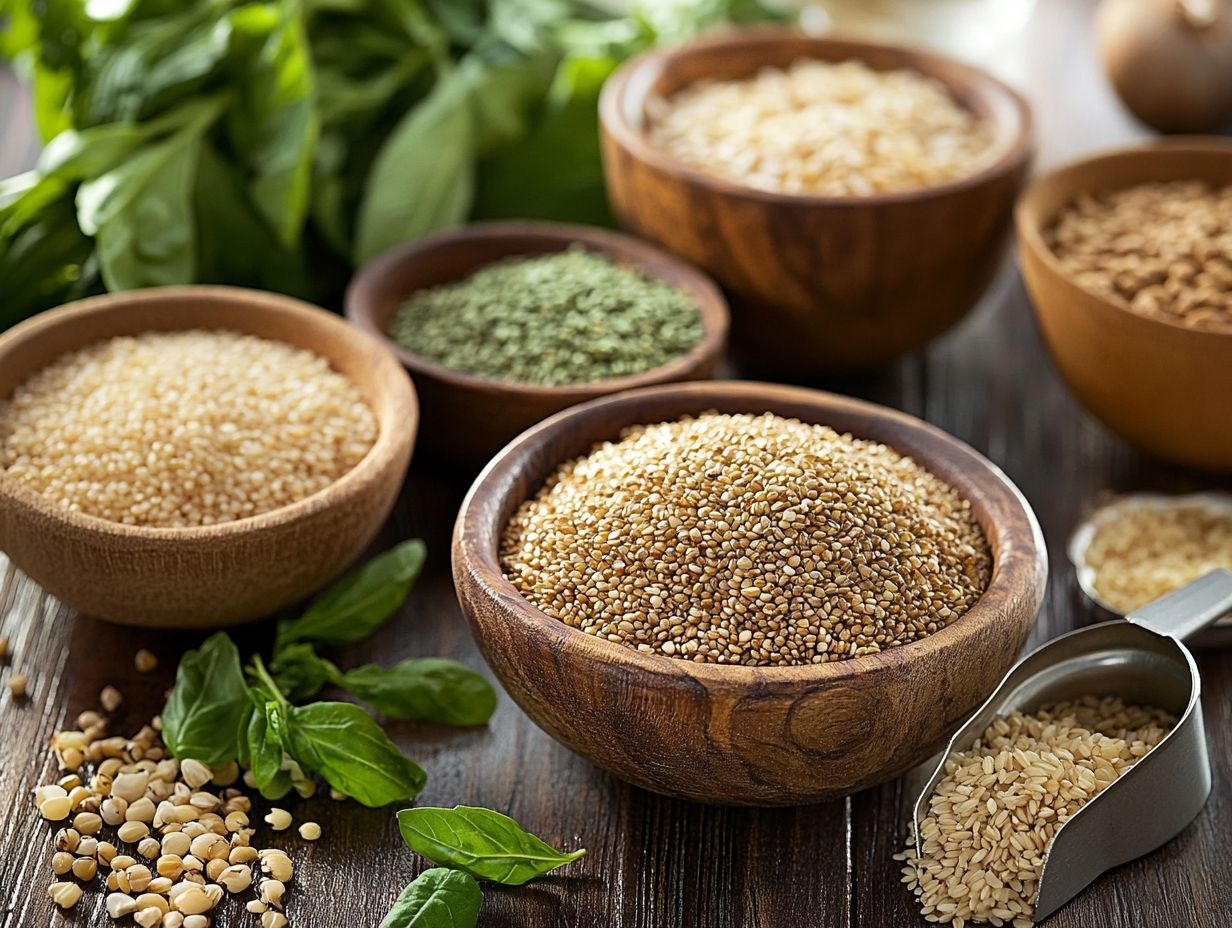
Key nutrients in whole grains include fiber, magnesium, and antioxidants. These nutrients are essential for health benefits like improved cholesterol levels and better heart health.
These vital components work together to lower the risks associated with heart disease, primarily by reducing bad cholesterol and helping to regulate blood pressure.
Research featured in the Journal of Nutrition suggests that individuals who embrace a diet rich in whole grains may experience lower markers of inflammation, which is crucial for preventing chronic diseases.
A thorough study published in the American Journal of Lifestyle Medicine highlights that dietary fiber from whole grains promotes healthy digestion. This significantly reduces the chances of gastrointestinal issues.
It s estimated that incorporating just three servings of whole grains into your daily routine can lead to a remarkable 15-20% reduction in heart disease risk. This underscores the profound positive impact these nutrients can have when woven into a balanced diet.
Whole Grains vs. Refined Grains
Understanding the differences between whole grains and refined grains is essential for making informed dietary choices. These two categories possess significantly different nutrient profiles and health implications.
Whole grains retain their bran and germ, offering vital nutrients and fiber. In contrast, refined grains undergo industrial milling processes that strip away valuable components, leading to a decline in nutrient quality.
This difference is important because it affects your health. Eating whole grains can lower your risk of type 2 diabetes, heart disease, and some cancers.
This underscores the importance of opting for whole grains over their refined counterparts.
Differences in Nutrient Content and Health Impact
The differences in nutrient content between whole grains and refined grains can significantly influence your health outcomes. Whole grains offer a wealth of vitamins, minerals, and antioxidants that refined grains simply don t possess.
This disparity is crucial when considering the risks associated with chronic diseases. Whole grains are packed with fiber and essential nutrients like magnesium and B vitamins, which contribute to better blood sugar control and can help reduce the risk of type 2 diabetes.
On the other hand, refined grains often lose these beneficial components, leading to sharper spikes in blood glucose levels. Research shows a strong link between eating a lot of refined grains and a higher risk of heart disease and some cancers.
By choosing whole grains, you can elevate the quality of your diet, supporting your overall health and potentially minimizing these serious health risks.
Incorporating Whole Grains into Your Diet
Adding whole grains to your diet is a tasty way to boost your health! When you follow dietary guidelines that promote whole grain consumption, you open the door to a variety of health-enhancing outcomes.
Easy and delicious ways to incorporate whole grains include swapping out refined grains for whole grains in your daily meals. This lets you enjoy the nutritional advantages while enhancing the overall quality of your diet.
From selecting whole grain bread to savoring a bowl of quinoa or oatmeal, there are countless delicious ways to make whole grains a staple on your plate. This not only tantalizes your taste buds but can also lead to improved health markers, such as lower cholesterol levels and better blood sugar regulation.
Tips for Adding Whole Grains to Meals
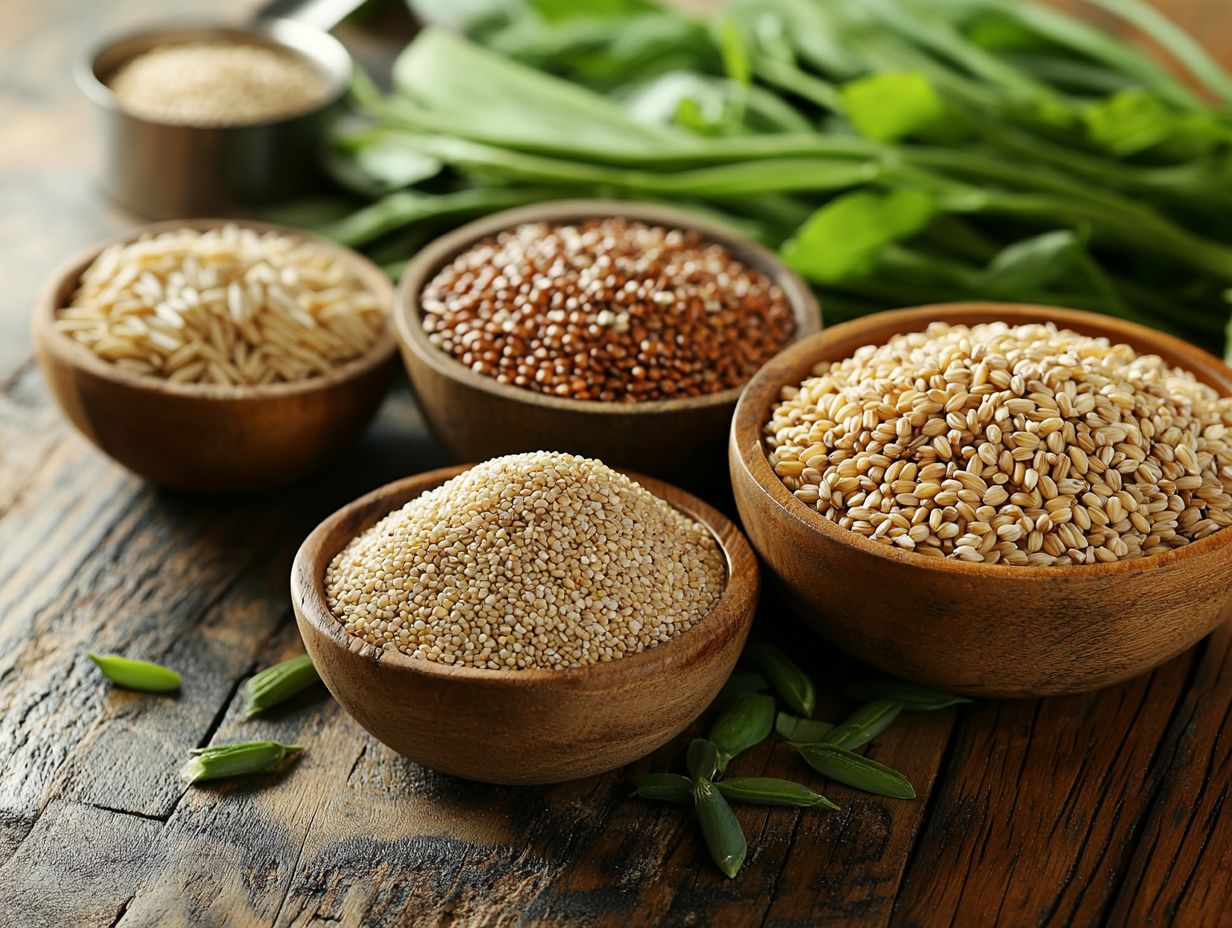
Incorporating whole grains into your meals can be both easy and rewarding. With plenty of tips and recipes at your disposal, you can welcome these nutritious foods into your diet.
Start by swapping refined grains for whole grain alternatives in your breakfast routine. Imagine enjoying overnight oats made with steel-cut oats, topped with fresh fruit and a sprinkle of nuts for an extra burst of flavor and delightful texture.
For lunch, consider adding quinoa or brown rice to your salads, enhancing both their nutritional value and your feeling of fullness. A hearty grain bowl filled with farro, roasted vegetables, and a drizzle of tahini can serve as a satisfying dinner option.
By thoughtfully incorporating these grains, you ll not only promote better health but also discover a treasure trove of new flavors and textures in your daily meals. Start today and discover the delicious possibilities with whole grains!
Potential Risks of Whole Grain Consumption
While whole grains are packed with health benefits, it s important to consider the potential risks they may pose, especially if you have specific health conditions like gluten intolerance or allergies. Knowing these side effects is crucial for your health.
Understanding your unique dietary needs allows you to enjoy the benefits of whole grains while avoiding any adverse effects.
Side Effects and Allergies to Watch Out For
If you have gluten intolerance, a condition where the body cannot properly digest gluten, or specific allergies, it s important to be mindful of potential side effects when consuming whole grains.
You may feel bloated or have gas after eating certain grains. In some cases, skin rashes or fatigue may also occur.
Knowing which grains to avoid is crucial. Exploring alternatives like quinoa, rice, or certified gluten-free oats can ensure you receive necessary nutrients without triggering unpleasant symptoms.
Incorporating a diverse range of fruits, vegetables, and legumes can further enhance your dietary variety while keeping problematic grains at bay. Additionally, consulting with a healthcare professional or registered dietitian can offer personalized strategies for adapting your diet and maintaining health without sacrificing nutrition.
Frequently Asked Questions
Here are some common questions about whole grains that might help you on your journey.
What are whole grains and why are they beneficial?
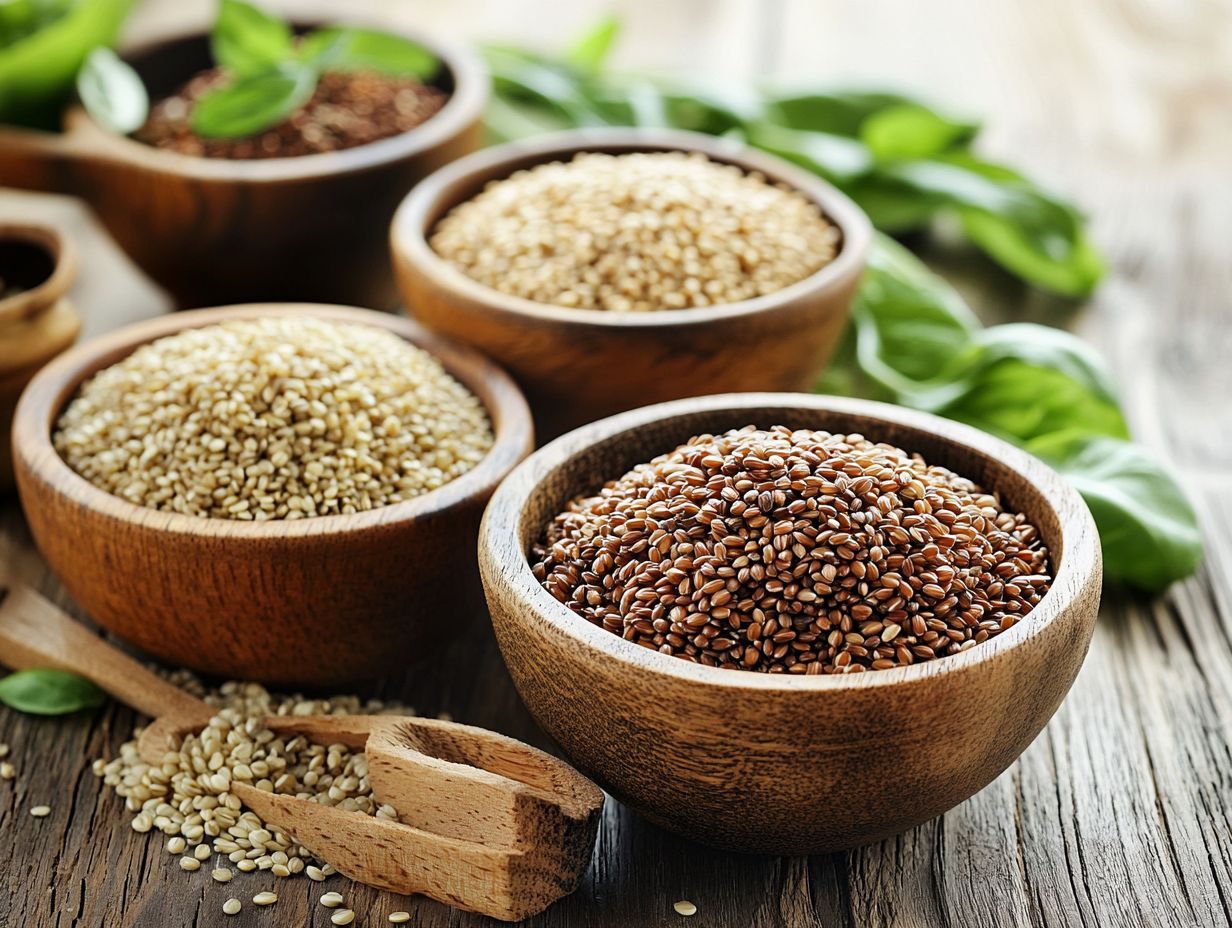
Whole grains are grains that contain all parts of the grain kernel, including the bran, germ, and endosperm. They are beneficial because they provide important nutrients such as fiber, vitamins, and minerals and may help reduce the risk of chronic diseases.
What are the different types of whole grains?
Some common types of whole grains include whole wheat, brown rice, quinoa, oats, and barley. However, there are many other less common varieties such as amaranth, millet, and spelt.
How much whole grains should I consume daily?
The Dietary Guidelines for Americans recommend consuming at least 3 servings (or 48 grams) of whole grains per day. However, remember that portion sizes may vary depending on the type of grain.
What are the health benefits of whole grains?
In addition to providing important nutrients, whole grains are linked to various health benefits, such as reducing the risk of heart disease, stroke, and type 2 diabetes. They may also aid in weight management and improve digestive health.
Are whole grains suitable for individuals with gluten intolerance or celiac disease?
This depends on the individual’s tolerance level and the type of grain. Whole grains such as oats, quinoa, and brown rice are naturally gluten-free and can be a safe option for those with gluten intolerance or celiac disease. It s important to always check food labels and look for certified gluten-free products.
How can I incorporate more whole grains into my diet?
You can easily add more whole grains to your meals. Switch from white bread to whole wheat, or choose brown rice instead of white rice.
Get creative with snacks! Try whole grain crackers paired with hummus for a tasty treat.
Start your journey towards healthier eating today by making these simple swaps!


